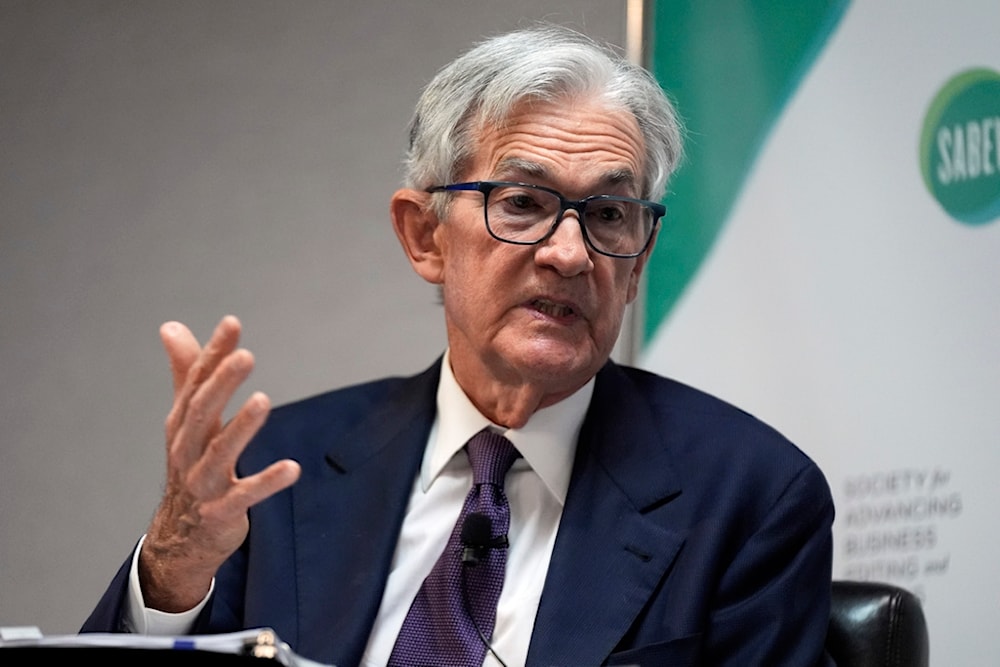Powell warns Trump's tariffs could fuel inflation, slow US economy
Federal Reserve Chair Jerome Powell warned that President Trump's sweeping new tariffs are likely to drive up inflation and slow economic growth, as global markets react with volatility and economists raise alarms over a potential dollar crisis.
-

Federal Reserve Chairman Jerome Powell speaks at the SABEW Annual Conference Society for Advancing Business Editing and Writing Annual Conference in Arlington, Va., Friday, April 4, 2025 (AP Photo/Manuel Balce Ceneta)
Federal Reserve Chair Jerome Powell warned on Friday that President Donald Trump's aggressive new tariffs are likely to trigger a sharp rise in inflation and weaken US economic growth, as global financial institutions brace for deeper disruptions across markets.
"It is now becoming clear that the tariff increases will be significantly larger than expected," Powell said in a speech delivered in Virginia. "The same is likely to be true of the economic effects, which will include higher inflation and slower growth." He added that it remains "too soon" for the Federal Reserve to adjust its current monetary policy.
The comments come after Trump announced major tariff hikes on key trading partners. China now faces a 54% tariff, while the European Union will be hit with a 20% levy starting April 9. India will be subject to a 26% rate, and a 25% duty has been imposed on all foreign-manufactured automobiles.
Powell spoke just minutes after Trump posted on social media, urging him to cut interest rates immediately and accusing him of playing politics while running the independent US central bank.
The announcement triggered a sharp downturn in financial markets. The S&P 500 ETF dropped 2%, the Nasdaq-100 ETF fell 3.3%, and the Dow Jones Industrial Average ETF slid 1%. Major importers like Nike and General Motors lost 6% and 3%, respectively, in after-hours trading. At the same time, investors sought safety in gold and the Swiss franc, both of which saw gains.
In a client note cited by Reuters, Deutsche Bank warned of a looming dollar crisis, with global head of foreign exchange research George Saravelos cautioning that "there is a risk that major shifts in capital flow allocations take over from currency fundamentals and that FX moves become disorderly." He added that the resulting volatility could create additional challenges for central banks, particularly the European Central Bank.
"The last thing the ECB wants is an externally imposed disinflationary shock from a loss in dollar confidence and a sharp appreciation in the euro on top of tariffs," Saravelos said.
China has responded by announcing a 34% tariff on all US imports. Economists at major financial institutions, including JPMorgan and Fitch, estimate that the trade conflict could shave up to 1.5% off US GDP and potentially push other major economies into recession.
Read more: EU retaliation to US tariffs could extend 'beyond customs duties'
Despite the economic turbulence, Trump defended the tariff strategy and called on the Federal Reserve to act swiftly. "This would be a PERFECT time for Fed Chairman Jerome Powell to cut Interest Rates," he wrote on Truth Social. "He is always 'late,' but he could now change his image, and quickly. CUT INTEREST RATES, JEROME, AND STOP PLAYING POLITICS!"
The Federal Reserve, however, has held firm. With inflation remaining above the 2% target and unemployment near historic lows, Powell signaled that the central bank would continue to monitor developments closely before making any policy moves.

 3 Min Read
3 Min Read









